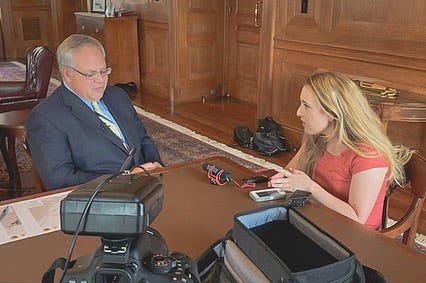Good afternoon,
I hope you had a wonderful Fourth of July! I’m traveling a bit this month and in August, so these dispatches might be more sporadic.
For you newbies out there, welcome to Outsider on the Inside. I hope this dispatch from in and around the nation’s capital on underreported topics finds you well.
If you’re just discovering my musings, here’s a backgrounder and make sure we’re connected on Facebook, Instagram, Twitter, and YouTube.
Quick Thoughts
Support and follow the work of IWF’s Center for Energy and Conservation today if you haven’t already.
Sarah Southerland, who managed Oklahoma Wildlife Department's social media accounts, signed off after four years of service. Learn about Sarah’s legacy here.
The Labour Party gained control of Great Britain in yesterday’s parliamentary elections. Oooof.
President Biden told the truth about his climate policies in a new gaffe. They *will* lead to energy shortages. And advisors close to Biden say it’s like the movie Weekend at Bernie’s. Oh boy. We’re witnessing a catastrophe in the Democrat Party.
Hunters and gun owners don’t vote? Here’s why.
That’s all for now. Stay tuned for the next dispatch later this week!
Overturning Chevron Doctrine Will Actually Boost Conservation.
Goodbye, Chevron Doctrine. We hardly knew you…
Progressives and bureaucracy lovers decried last Friday’s 6-3 Supreme Court decision as a boon to corporations. Right on cue.
Even People Magazine, notable celebrity news outlet, weighed in on the subject and decried the ruling as follows: “The "Chevron deference" has long been the backbone of how corporations are regulated. The new ruling strips federal agencies of their power to determine what's best for Americans.”
Environmentalists panicked and restored to fearmongering, naturally. As I noted at Townhall today, here’s some of the reactions:
Critics, naturally, claimed the ruling would trigger environmental chaos and the perpetuation of a “climate crisis.”The far-left Union of Concerned Scientists bemoaned the decision for allegedly giving oil and gas companies “more latitude to slow down and block regulations” and “pollute with near impunity. The Atlantic said the ruling will “erode away the country’s climate and environmental ambitions.” The Nature Conservancy claimed, “The decisions are likely to present challenges to preserving the many decades of progress we have made in protecting people and the planet.”
If you work in conservation or energy issues, you know that overregulation is counterintuitive and can, ironically, invite environmental problems. I’ve never heard a reasonable person, say, “Please government, regulate me more! I’ll be a better conservationist if you impose more costs on me or my business.”
In fact, the opposite is true. I continued in my Townhall column:
The more onerous and costly regulations imposed on people under the guise of environmentalism, the less our peers are inclined to support related causes. Ironically, imposing climate-centric environmental regulations is shown to harm the environment further. Even the EPA once acknowledged onerous rulemaking is often “too expensive, reduces economic growth, hurts international competitiveness, and causes widespread layoffs and plant closures.”
Does any reasonable person believe federal agencies are the best arbiters of what’s best for Americans? I don’t. Pew Research just published data that finds public trust in government remains at historic lows:
As of April 2024, 22% of Americans say they trust the government in Washington to do what is right “just about always” (2%) or “most of the time” (21%). Last year, 16% said they trusted the government just about always or most of the time, which was among the lowest measures in nearly seven decades of polling.
How can one place that so much faith in the bureaucracy? You shouldn’t. I certainly don’t. But in all seriousness, overturning Chevron Deference isn’t that controversial nor will it erode the environment. The opposite effect will be witnessed. Here’s analysis I wrote back in January for IWF:
The Chevron doctrine says “courts should defer to a federal agency’s interpretation of an ambiguous statute as long as that interpretation is reasonable.” The “two-step” process of reviewing agency statutes seeks to determine 1) if a statute in question is ambiguous and 2) if the ambiguous statute is reasonable.
In the 40 years since Chevron was decided, it’s invited government agencies to engage rulemaking that exceeds their authority since these powers are constitutionally prescribed to Congress. The Wall Street Journal Editorial Board wrote Chevron deference “has no constitutional basis,” undermines the Administrative Procedure Act, and potentially violates the Constitution’s Due Process Clause.
The Loper plaintiffs, a group of New Jersey fishermen, believe the Commerce Department is imposing unreasonable monitoring fees on them under the Magnuson Stevens Act of 1976 using this doctrine.As I noted here at IWF, the fishermen currently fork over 20% of their earnings to federal observers under the Chevron doctrine:
“There’s a funding scheme in place, the fishermen’s lawyers argue, that forces them to fork over about 20% of their pay to third-party National Oceanic and Atmospheric Administration (NOAA) Fisheries observers. Congress, however, has never mandated commercial fishermen to report to observers.”
They also argue the law National Oceanic and Atmospheric Administration (NOAA) Fisheries – or National Marine Fisheries Service (NMFS) – can’t require federal observers aboard their vessels. The plaintiffs operate in the Atlantic herring fishery, which is not required by the MSA to pay observers. The law only requires observers in three narrow instances.
The executive branch - including federal agencies - lack the statutory authority to create regulations. That’s Congress’ job. West Virginia vs. EPA concluded this in summer 2022. Various appeals courts have dealt agencies that deal with energy and environmental issues a big blow —most recently with water usage regulation in household appliances. Now a final blow was dealt to the entrenched federal bureaucracy.
Deregulation won’t lead to the decimation of our environment. This decision brings power back to the people. And we have commercial fishermen to thank for restoring freedom back to us.
I’ll toast to that!
Blast from the Past
Five years ago this summer, I interviewed former Trump Interior Secretary David Bernhardt for the first time. This was one of the most important interviews I’ve conducted thus far in my career.



This first interview from 2019 was printed in Sporting Classics and subsequently posted on District of Conservation.
I also had the great fortune of interviewing Mr. Bernhardt again in an exit interview (cross-posted on my podcast) on the last day of the first Trump administration.
Will he be back in his old job in a hypothetical second Trump administration? I’d love to ask him that. I’ll keep you all posted if I get the opportunity to interview him again.
ICYMI
Articles/commentary/media appearances from the past week.
MEDIA MENTIONS
n/a
ARTICLES/BLOGS
IWF: Federal Judge Blocks Pause Of LNG Export Projects
Townhall: Overturning Chevron Doctrine Won’t Lead to Environmental Destruction
District of Conservation
Catch up on District of Conservation episodes below.
And check out a new episode of The Sportswoman Show with Fish Untamed host Katie Burgert!
Thank you for reading! Let me know your thoughts and encourage your friends to subscribe to the newsletter too.
—Gabriella





